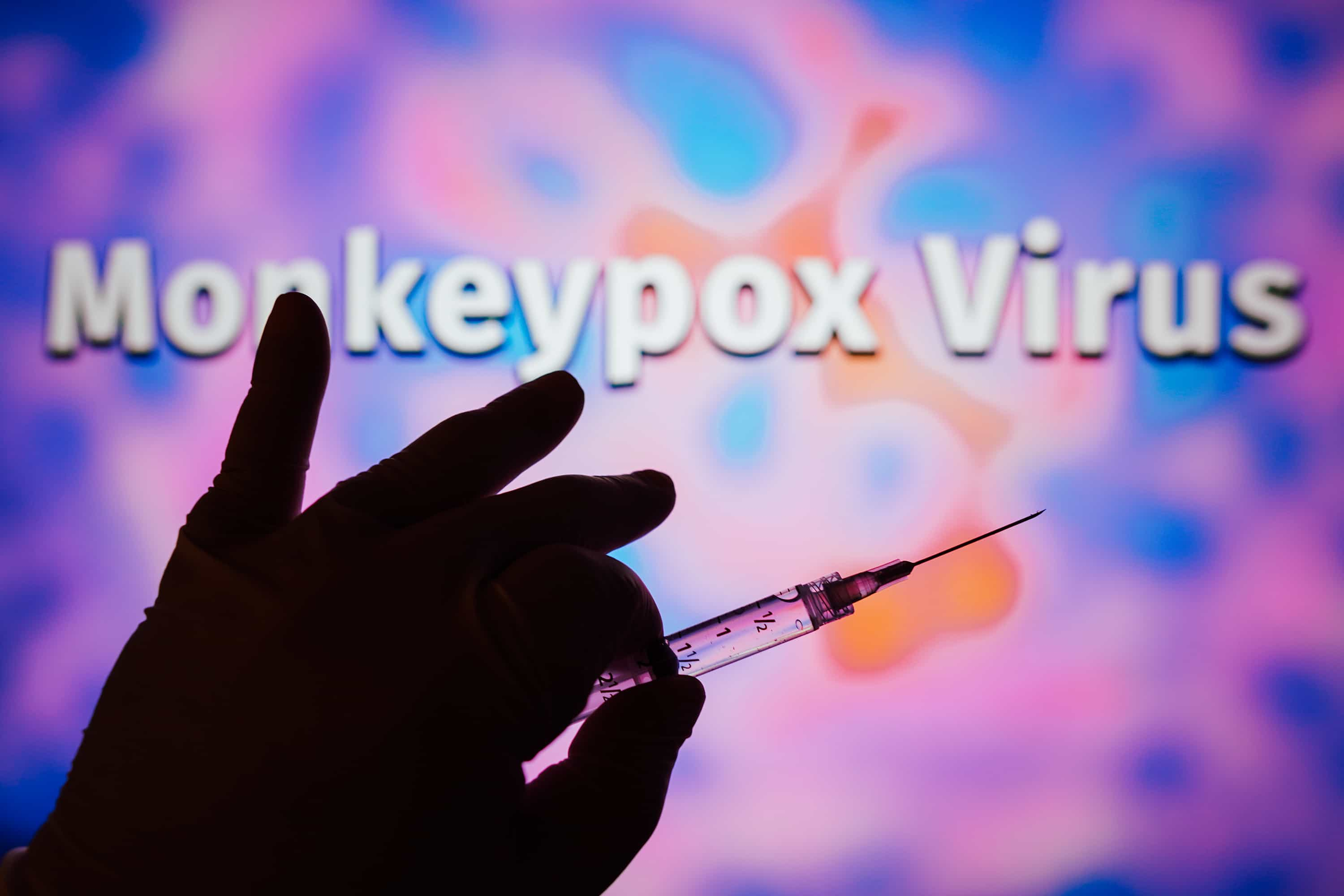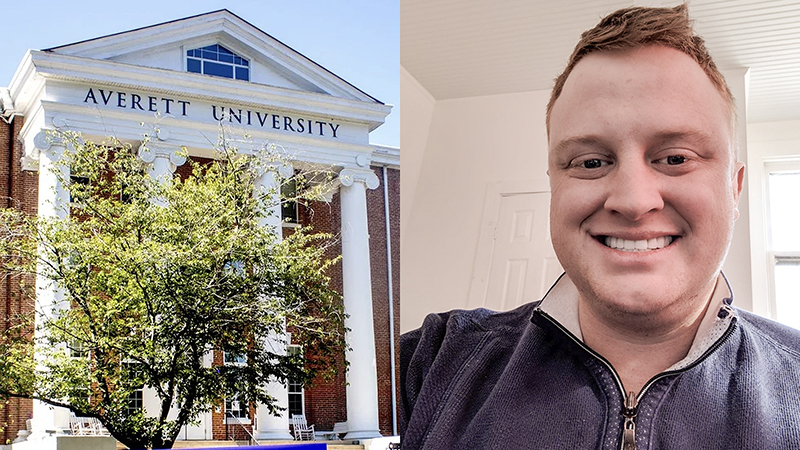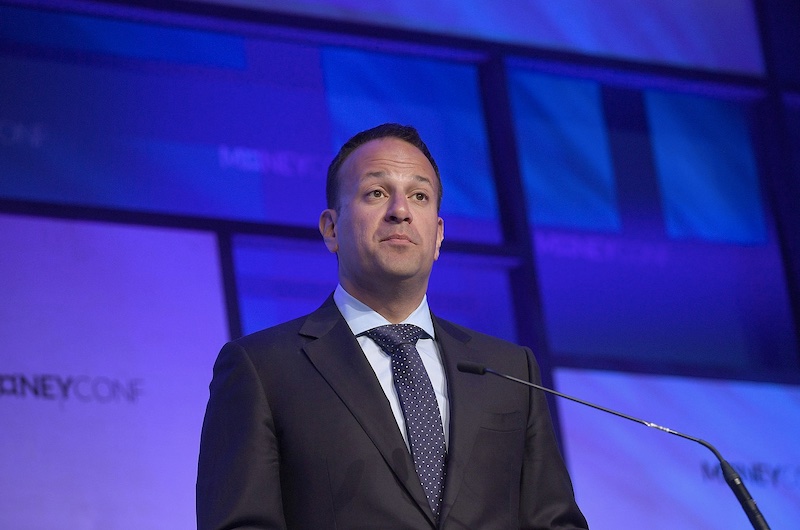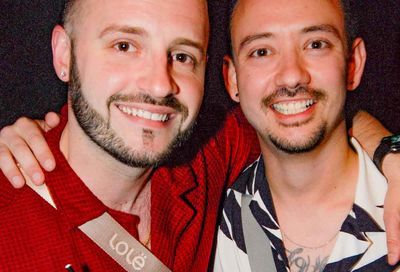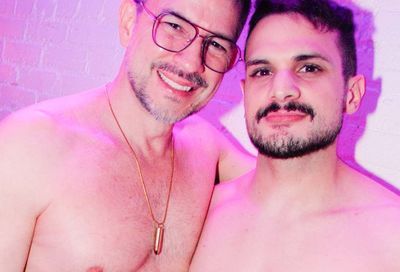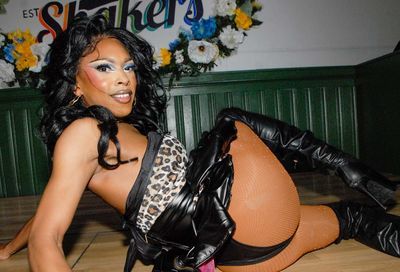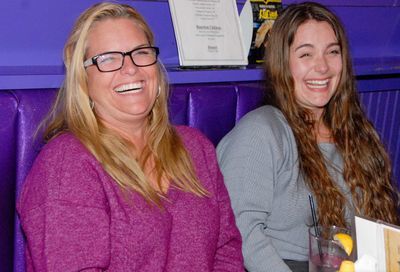Local Leverage
While the nation suffers White House fever, local gay politicos keep an eye close to home
By so many measures, the 2004 presidential race is unprecedented. The George W. Bush vs. John Kerry slugfest is breaking records with money spent and voters registered. The American constituency is the most polarized it’s been in decades, with voters squaring off in their respective champ’s corner.
With all the money, emotion and attention being heaped on this race, however, it may be easy for voters to lose sight of the races for far more pedestrian offices, like member of the school board. Of the throngs of newly registered voters swept up in the push to either dump Bush or stay the course, depending on one’s political druthers, how many know that the ballot will be asking for a number of choices beyond president?
The D.C. area is full of politicians and political enthusiasts. For the area’s gay and lesbian voters planning to pull the lever or touch the screen Nov. 2, their insights should be helpful in looking beyond the main event.
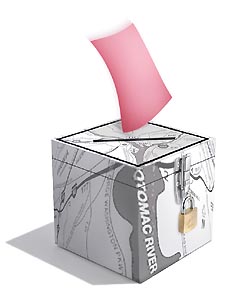 |
“Whether the presidential race is a distraction from our local races, you can look at that two ways,” offers Rick Rosendall, vice president for political affairs for the Gay & Lesbian Activists Alliance, the nation’s longest-running gay civil rights organization, and a local institution. “A lot of people are so worn out from the rancor and endless coverage of the presidential race that they might regard the council and school board races as a welcome distraction. There’s no way of knowing what percentage of District voters are paying serious attention to these local races.”
Rosendall notes that while the nonpartisan GLAA makes no endorsements, it does rate candidates for both the D.C. City Council and the Board of Education. The GLAA posts the ratings on the group’s Web site (www.glaa.org) and in advertisements in local media.
“[We] hope that our information will at least be included in the mix for people who care about gay issues,” Rosendall says.
As well as the council and school board, D.C. voters will also be asked to cast votes for 286 Advisory Neighborhood Commission seats. In Maryland, Nov. 2 will decide eight congressional representative races, one senate race, and a number of circuit court judges. Around the commonwealth, Virginians will be choosing 11 congressional representatives, several mayors, town councilors and school board members.
With so many races to be decided, certainly there are a few that can pull some attention away from the race for the White House.
Virginia’s District 8 race is probably the strongest contender. Voters in this Northern Virginia district will choose between Democratic incumbent Jim Moran and Republican challenger Lisa Marie Cheney. Plenty of gay Virginians are taking a stand in this race, albeit on opposite sides.
“In the Northern Virginia area, we’ve endorsed Jim Moran,” says Joshua Israel, president of the Virginia Partisans, a gay Democrats’ club. “He’s pretty much gotten a 100 percent HRC rating.” (The 100 percent rating comes from the Human Rights Campaign, the country’s largest LGBT advocacy organization, which offers percentile ratings of all members of Congress.)
“He’s been a steadfast supporter of everything of importance to our community, the whole range of issues,” Israel continues. “His opponent, Lisa Marie Cheney, is an opponent of civil unions, hate crime protections including gays and lesbians, an opponent of allowing gays and lesbians to serve openly, and of a woman’s right to choose. The Eighth District is a mainstream, well-educated, progressive district, and the Republicans have a candidate who is anything but moderate.”
Certainly that’s not the way David Lampo, vice president of the Log Cabin Republicans (LCR) of Virginia, the state-level affiliate of the national gay GOP group, sees it.
“The club unanimously endorsed Cheney,” says Lampo, explaining that for LCR of Virginia “unanimous” means about 25 votes. Technically, LCR bylaws dictate that the local club recommend an endorsement, which is then cleared through the national office, Lampo clarifies.
“She gets the endorsement because she typifies the inclusive Republican candidate,” says Lampo. “She’s been to our meetings. She believes in gay and lesbian involvement in the Republican Party. She supports our opposition to the marriage amendment. She supports ENDA (Employment Non-Discrimination Act). She’s the kind of ‘big tent’ Republican we support.”
Jay Fisette, vice chair of the Arlington County Board, is one of Virginia’s few openly gay elected officials. He lives in the Eighth District, and at one point announced he would challenge Moran for his seat in Congress. Fisette has since dropped that aspiration — at least for now — and instead endorsed Moran in the Nov. 2 election.
“They endorsed my opponent when I ran,” says Fisette with a laugh about LCR of Virginia’s backing of Cheney.
“The Log Cabin club has some very good people in it, but sometimes when it comes to endorsements they stretch their credibility. But they are a Republican club,” says Fisette, granting the differences in gay voters’ political loyalties.
Aside from the Cheney vs. Moran race, Fisette says he is paying close attention to the Arlington County school board race. A feather in the cap for politically progressive Virginians, the county’s school board is almost radically inclusive by Virginia standards.
“It’s perhaps the most gay-friendly school board in Virginia,” says Fisette. “If you’re a teacher and openly gay, you’re protected [from being fired]. Every one of the high schools has a gay-straight alliance.”
Fisette says he’s endorsed the two school board incumbents facing challengers: Libby Garvey, board chair, and Frank K. Wilson.
He has also endorsed his colleague on the Arlington County Board, Barbara Favola, who serves as chair.
“She’s just a terribly strong supporter of gay and lesbian issues.” Fisette says. “She faces very weak opposition in the November election. She should be overwhelmingly reelected. County Board is a very important local race.”
In this volatile election season, however, Fisette cautions against taking anything for granted.
“I would expect that none of [the races] are particularly tight. But you can never count your chickens before they’re hatched. You can’t be complacent. My message is [that] anyone going with an eye on the presidential race, please vote in all the races. Don’t forget the local races.”
Across the border in Maryland, Dan Furmansky, the executive director of Equality Maryland (formerly Free State Justice), the state’s nonpartisan gay-rights organization, strikes a somewhat different chord.
Of the various races and ballot questions facing Marylanders Nov. 2, Furmansky seems to take the greatest interest in the U.S. Senate race between Democratic Sen. Barbara A. Mikulski and her Republican challenger, Maryland State Sen. E.J. Pipkin.
Furmansky says Equality Maryland has not been very involved in state and local elections this season and has made no endorsements, preferring to wait till 2006 when the entire Maryland General Assembly will be up for election, along with several other statewide positions, including governor.
“Informally, we obviously support Mikulski,” Furmansky says, highlighting Mikulski’s political track record as an advocate of gay civil rights. But it’s not a race that has Equality Maryland taking up battle positions. Says Furmansky, “[Pipkin] is not someone we think would be supportive of LGBT initiatives. But there’s no race, she’s a shoe-in.”
Back in D.C., few if any are expecting any surprises in the City Council races, which were largely decided in the September primaries. The city’s major gay Democratic organization, the Gertrude Stein Democratic Club, has been putting its efforts into campaigning for John Kerry among undecided Pennsylvania voters. The club’s “D.C. Rainbow Riders” have been making regular forays into the Keystone State.
“Our major [D.C.] elections are pretty much guaranteed,” explains David Meadows, president of the Gertrude Stein Democrats. “We certainly worked harder for our endorsed candidates during the primary. But now we can focus our efforts to keep Pennsylvania in the blue.” Various poll tallies regularly mark states won by Democratic presidential candidates as blue, with red for Republicans.
Meadows’ group has endorsed some Democrats in the local races: incumbent congressional Del. Eleanor Holmes Norton; Ray Browne, incumbent congressional shadow representative; incumbent city council members Jack Evans (Ward 2) and Adrian Fenty (Ward 4); and city council Ward 7 challenger, Vincent Gray.
While the Gertrude Stein Democrats are not endorsing any ANC or school board candidates, the club did offer a candidate forum for Board of Education hopefuls. One seat each is up for grabs in district 1, which encompasses Wards 1 and 2, and district 2, which encompasses Wards 3 and 4.
The district’s gay Republicans may have more opportunity to make inroads during the local elections. Considering 75 percent of the city’s voters are registered as Democrats, aiming for big rewards would likely be foolish. The District is about as likely to fall for Bush as Mary Cheney is to vote for Kerry. Confident that Republican Councilmember Carol Schwartz’s seat is not likely to change hands Nov. 2, D.C.’s gay Republicans needn’t be on the defensive.
“I think people are focused almost solely on local races, on supporting people who support us,” says Bryan Pruitt, president of the Log Cabin Republicans’ D.C. chapter, of his fellow local gay GOPers. He notes that since the national LCR has declined to endorse Bush for president, the local races become an obvious outlet for gay Republicans’ political enthusiasm.
“We as an organization are focusing on the local level and electing gay-friendly candidates,” Pruitt offers. “All Republican candidates in the District of Columbia are gay-friendly. We’re obviously very supportive of Carol [Schwartz]. Carol has been a great friend to Log Cabin. Â… We do have one member in particular running for an ANC seat. His name is Matt Raymond. He’s a member of LCR.”
Raymond is running for a spot on the Logan Circle ANC. This particular ANC may offer a more interesting race than most, as the all incumbents but one are vacating their seats. Further, the Logan Circle neighborhood has a large number of gay residents and Christopher Dyer, a longtime D.C. gay advocate for groups like the Sexual Minority Youth Alliance, is running for a spot on the Logan ANC.
Mark Lee, a local gay nightlife promoter, says the Logan Circle ANC race is one he’ll be watching closely. Lee, who works with the Committee for a Living D.C. and the Restaurant Association of Metropolitan Washington, along with operating his own Atlas Events, has often dealt with ANCs and city councilors regarding liquor licenses and efforts to ban smoking in bars and restaurants.
A voter’s guide was released by SmokefreeDC, whose agenda of banning smoking in all the District’s public venues runs perfectly counter to Lee’s. Still, even this last-minute electioneering against his public campaign to keep D.C. venues from going smoke-free couldn’t spark Lee’s interest. He says that the guide’s listing of city council candidates who would likely push for a smoking ban in bars, restaurants and other nightspots, was irrelevant.
“This is not an issue in the election,” Lee insists. “The voter guide is crazily slanted. Â… In the District, the elections are pretty much decided in the primaries.”
The Logan Circle ANC race that has grabbed Lee’s attention, however, won’t be decided until Tuesday, as the sole remaining Logan Circle ANC incumbent Jim Brandon faces challenger Goud P. Maragani.
Brandon, 72, is a gay man who has lived in the Logan Circle neighborhood since 1986 and estimates that he’s served eight terms on the ANC.
“There’s very little attention paid to these races, which is why putting up all these signs is important,” Brandon laments. “Often times, people won’t even get to the bottom of the ballot. Then maybe they’ll just vote for the name on top.”
Brandon says he’s spent his years on the ANC primarily trying to preserve Logan Circle’s historical integrity in the face of ongoing development. Beyond that, Brandon emphasizes that ANC members are a neighborhood resident’s most accessible level of elected representation, albeit unsung.
“We’re the lowest people on the totem pole,” says Brandon. “It’s unpaid. There are no perks. You get called in the middle of the night. Â… Really and truly, there should be an association called Politicians Anonymous to care for people like me. There would be a 12-step program and they could send someone to sit with me when I file to run and talk me out of it. I’m addicted to the stuff.”
Rob Halligan will be running unopposed for his second ANC term on Nov. 2. Though straight, he represents a very gay Dupont Circle neighborhood. He grants that keeping up with all the minor candidates or issues on a ballot may be difficult, but not just locally.
“You have to do a lot of local reading to keep up with what’s going on in a neighborhood,” says Halligan. “It’s nationwide. A lot of people don’t know who their state and local delegates are. A lot of people know who represents the country, but they don’t know who represents their neighborhood.”
Halligan advises that it may well be worthwhile for D.C. voters to examine their choices on the local level before casting votes on Tuesday.
“It depends on the neighborhood, but in Dupont we do a lot,” Halligan explains. “A lot of us are nearly full-time. People think of us as the people to help address a problem. I can get 50 ANC e-mails a day.”
With the presidential race embroiling the electorate, it’s not difficult to see how voters could lose track of the minor races that may nevertheless have a big impact on their lives.
“Federal races overshadow local races,” Log Cabin’s Lampo says plainly. “In Arlington, there’s a school board race and a county board race. When you look at the vote totals that will go to those candidates, they will be far lower than the number of votes for president. All those local races are very important. They may also have as great an impact on voters’ day-to-day lives as the federal races. In the long-term, one reason for that is that political power has become more and more centralized in the federal government. You have this gravitation to where the power and money is, and that’s Washington, D.C.”
With characteristic partisanship, Virginia Partisans’ Israel, agrees with the notion that the presidential race has taken more than its share of attention away from local races. He manages some optimism for these smaller — but important — contests.
“George Bush has been so virulently anti-gay and such a miserable failure that that’s really the big focus on everyone’s minds,” say Israel. “But there’s definitely some enthusiasm for these congressional races.”
That this contentious presidential battle will bring record numbers of voters to the poll seems beyond question. Whether they’ll be able to make informed decisions all the way to the bottom of the ballot remains to be seen.
Support Metro Weekly’s Journalism
These are challenging times for news organizations. And yet it’s crucial we stay active and provide vital resources and information to both our local readers and the world. So won’t you please take a moment and consider supporting Metro Weekly with a membership? For as little as $5 a month, you can help ensure Metro Weekly magazine and MetroWeekly.com remain free, viable resources as we provide the best, most diverse, culturally-resonant LGBTQ coverage in both the D.C. region and around the world. Memberships come with exclusive perks and discounts, your own personal digital delivery of each week’s magazine (and an archive), access to our Member's Lounge when it launches this fall, and exclusive members-only items like Metro Weekly Membership Mugs and Tote Bags! Check out all our membership levels here and please join us today!




